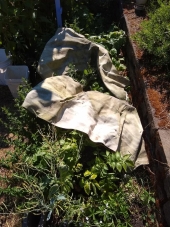




 2
2




Trying to achieve self-reliance on a tiny suburban plot: http://gardenofgaladriel.blogspot.com









Works at a residential alternative high school in the Himalayas SECMOL.org . "Back home" is Cape Cod, E Coast USA.





 1
1




Works at a residential alternative high school in the Himalayas SECMOL.org . "Back home" is Cape Cod, E Coast USA.




Rebecca Norman wrote:Washing the pot was a disincentive to using local grains, but I found a solution. I have some single-serving size covered steel containers called tiffins in India.
Measure and mix the porridge, water and other ingredients in each tiffin. Bring a half inch of water to the boil in the pressure cooker, then stack the tiffins and close it. Simmer at pressure for however long, then pull out the tiffins (wearing a thick rubber glove helps). If you eat right from the tiffins you only have to wash them, not the pot.





 1
1




Works at a residential alternative high school in the Himalayas SECMOL.org . "Back home" is Cape Cod, E Coast USA.





 1
1




Works at a residential alternative high school in the Himalayas SECMOL.org . "Back home" is Cape Cod, E Coast USA.




Elizabeth Smith wrote:I like your ideas for reusing the cutting boards! I would need to find a way to store them in between uses so I did not have 4 cutting boards on my counter all the time.
Trying to achieve self-reliance on a tiny suburban plot: http://gardenofgaladriel.blogspot.com




 3
3




Samantha Langlois
www.organiclifeguru.com




 Or fire starting material.
Or fire starting material.
Just me and my kids, off griddin' it - follow along our shenanigans at our YouTube Uncle Dutch Farms.




Just me and my kids, off griddin' it - follow along our shenanigans at our YouTube Uncle Dutch Farms.









Works at a residential alternative high school in the Himalayas SECMOL.org . "Back home" is Cape Cod, E Coast USA.





|
Always! Wait. Never. Shut up. Look at this tiny ad.
The new kickstarter is now live!
https://www.kickstarter.com/projects/paulwheaton/garden-cards
|







